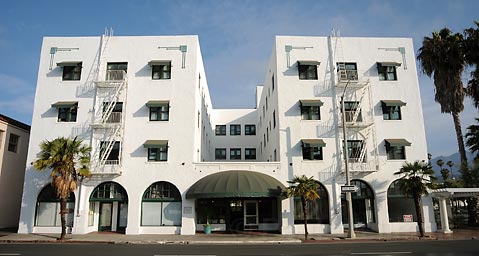Faulding Residents Bemoan Smoking
Building Politics Grind Progress to a Halt

Many residents of Haley Street’s New Faulding Hotel are becoming very outspoken about smoking in their building. Beyond stinking up the public areas, the objecting Faulding tenants say that noxious cigarette smoke endangers their health. While some residents feel isolated in their anti-smoking stance, many are now actively seeking help from staff and the outside world in making the Faulding cigarette-free.
The Faulding Hotel-the four-story building that, despite its name, is actually an apartment complex-provides housing to those with little or no income. Many of the Faulding’s residents suffer from mental illnesses or have histories of substance abuse. And there are others who moved into one of the Faulding’s 81 units as a result of circumstances that were out of their control; many tenants were forced into the musky, stained-carpet hotel because they became ill or physically handicapped and could no longer keep their jobs or support themselves. In short, the building provides Santa Barbarans shelter when they need it most.

Owned today by the Santa Barbara Community Housing Corporation (SBCHC), the Faulding has hosted squabbles about smoking before. Recently, this refuge has become gripped with tension between the management and residents who claim their health and well-being are endangered.
At the center of the debate is 10-year resident Michael Merenda, the self-proclaimed spokesperson for residents who believe smoking should be banned from the building. Merenda is the most outspoken of those who agree with him, and has heckled management on the issue for the last six years. Merenda said the most immediate reason for a ban is the glaring fire hazard. Several times in the building’s history, fires have been started by residents who have fallen asleep with a lit cigarette in hand. Also, trashcans located in the common areas between the wings of the residential floors have caught fire because absentminded residents tossed in still-lit cigarettes on their way downstairs. According to Merenda, the building is in perpetual danger of burning down so long as smoking is permitted. Furthermore, its close proximity to several downtown establishments-State Street restaurants such as Pierre Lafond and Something’s Fishy-endangers pedestrians and tourists as well.
On a more personal level, second-hand smoke endangers the health of Faulding residents-some more so than others. A number of the building’s tenants suffer from health problems that are agitated by cigarette smoke. Though the Faulding rules allow smoking only in residential rooms and forbid it in common areas (the lobby and hallways), airflow causes smoking behind closed doors to still affect residents. “Airflow is so important in preventing diseases and mold proliferation and infection,” Merenda said. “This is a serious problem at the Faulding.” And though there are windows at each common area and at the end of each wing, many residents do not feel that they suffice.
Many residents expressed their concern with third-hand smoke-the remnants of poisonous cigarette chemicals that cling to the clothing and surroundings of smokers. Residents say this is a major threat to their health, especially considering that the carpets have not been steam-cleaned in seven years. Many of the apartments look like dormitory rooms, with a single bed and a small window. Tenants complain that when they open windows in the common bathrooms and at the end of the wings on several floors, someone else habitually closes them. The management denies the allegation, but several residents maintain that staff and certain residents are guilty of this practice.
One Faulding resident, who declined to state his name, made his case very convincingly: “The civilized are, in the Faulding, the bad guys.” The unnamed tenant suffers from a debilitating illness that is exacerbated by cigarette smoke and toxins, yet he cannot escape them-his neighbors smoke at their windows, and on windy days, the smoke enters his bedroom. According to the resident, the high-walled lobby “smells like an ashtray in the evenings,” often making it a struggle for him to leave his room. He claimed that his complaints have been ignored by the staff. Throughout the building’s rough history, several residents have been rushed to the hospital due to asthma attacks and immediate upsets caused by their involuntarily inhalation of cigarette smoke; the disease most commonly mentioned was chronic obstructive pulmonary disease. Many residents have it, and for those suffering from the disease, cigarette smoke is unbearable and immediately perilous to their health.
Merenda claimed that there is an “incredible amount of apathy” within the building’s management. Other residents shared this sentiment, some stating they would feel threatened if they spoke out against the staff and the building’s rules. There are difficult relationships between many residents and staff members, and both sides emphasize their victimization in the matter. This has prolonged the argument, resulting in nothing but slow bureaucracy on the side of management.
Yet, despite the allegations of carelessness and unjust conduct by the in-house management, things are looking up. “The current director of the Faulding deserves credit for his interest in creating dialogue. And there are boardmembers interested in improvements,” Merenda said. “I believe they are sincerely concerned.”
Director of the SBCHC Emmet Hawkes is the spokesperson for Faulding. He said he is looking for solutions to the smoking problem and hopes to rework the Faulding’s rules to please people and calm agitation. Since he became director last October, Hawkes designed a survey to catalog the opinions of each resident on the smoking issue. It was written in cooperation with Dawn Dunn, director of the Public Health Department’s Tobacco Prevention and Settlement Program, a respected person among both Faulding residents and staff. The survey, according to Hawkes, was given to the 70-odd tenants, and yet only half were filled out and returned. Of that half, the majority were either indifferent to indoor smoking or in favor of it. Of the residents available for comment, only two were smokers, and one claimed he would quit smoking if it meant the Faulding would be a smoke-free building.
However, there is a problem, according to Dunn. The survey is not anonymous; it asks for the resident’s room number. This has led to unsigned surveys, likely caused by fear of reprisal among residents who returned surveys to the staff. “If it’s anonymous, it’s worthless to me,” said Hawkes, remaining steadfast. “It’s necessary that the residents identify themselves because if unhealthy residents [do], they could be moved away from a smoking neighbor [near] them.” Hawkes said that a proposal is in the works to designate one floor to be nonsmoking. Other variations could be considered in its place following a meeting scheduled later this month.
Hawkes says that he is not ready to ban smoking entirely but refuses to ignore angry residents and is working somewhere in the middle. Residents continue to raise their helpless and often ignored concerns. The end result, at least for now, is a slow-moving discussion between Faulding management and the sick and opinionated residents, interrupted as it creeps along by argument, emotion, and politics.



